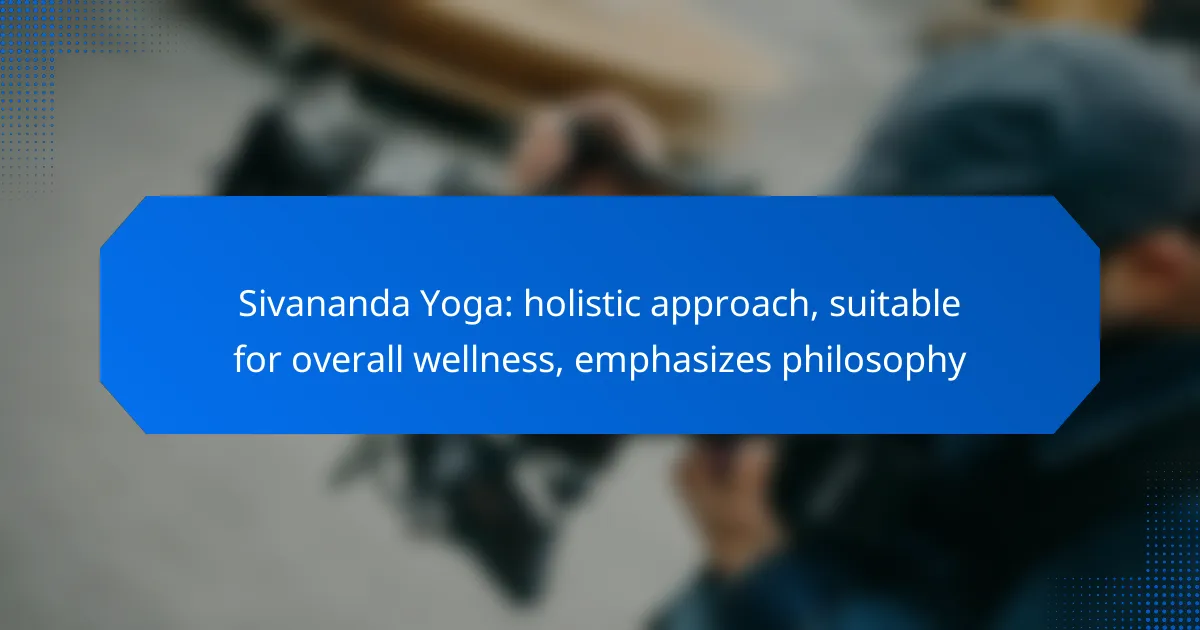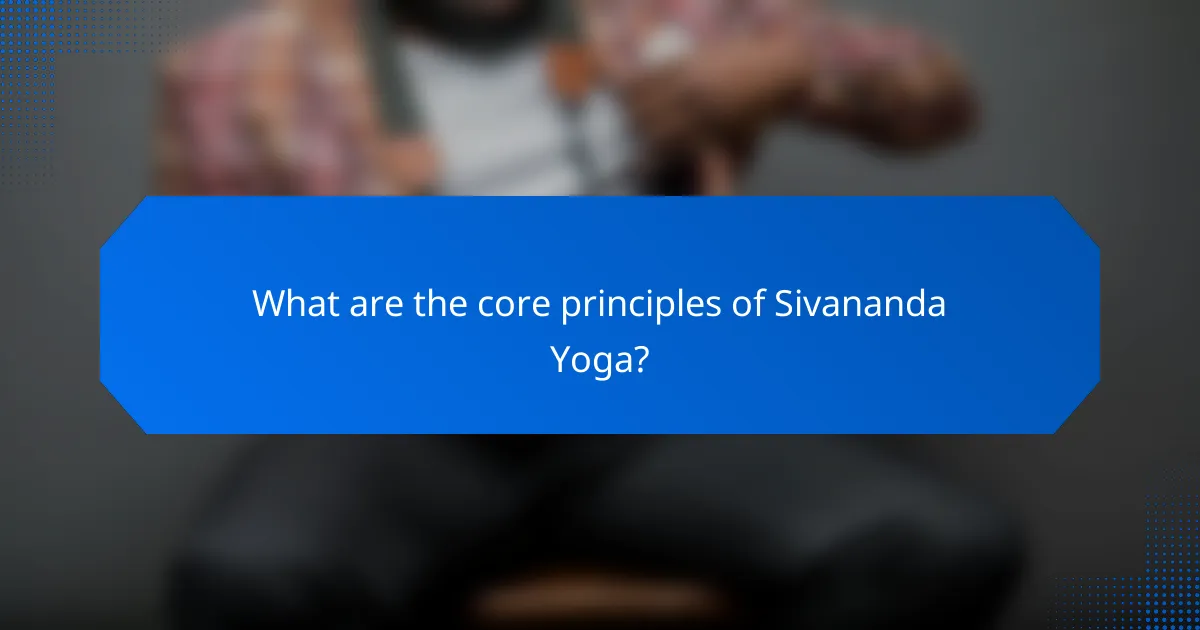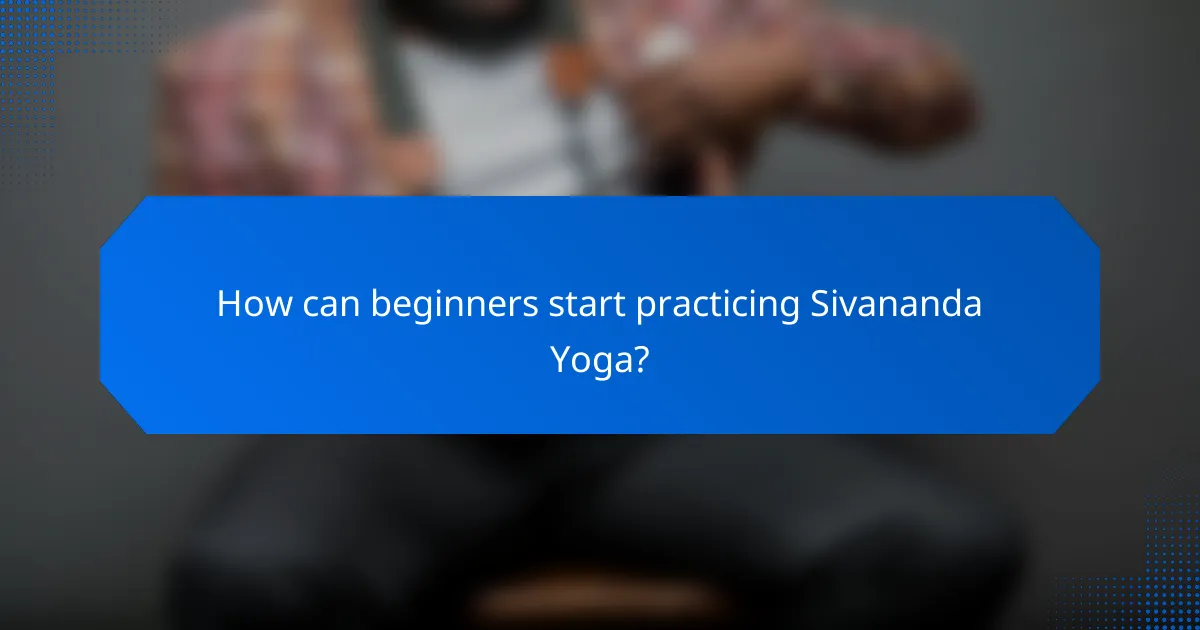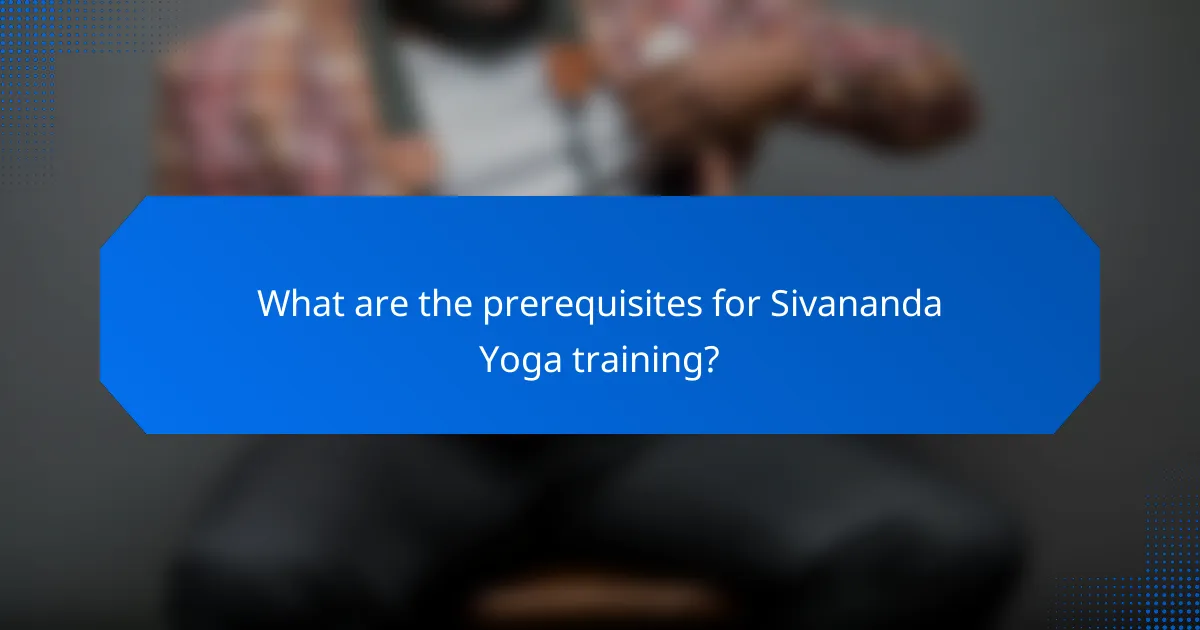
Sivananda Yoga: holistic approach, suitable for overall wellness, emphasizes philosophy
Sivananda Yoga offers a holistic approach to wellness by integrating physical, mental, and spiritual practices that foster overall health. Emphasizing a balanced lifestyle and philosophical understanding, it provides a comprehensive framework for individuals seeking to enhance their well-being. Suitable for practitioners of all levels, Sivananda Yoga combines postures, breathing techniques, and meditation to promote a harmonious life.

How does Sivananda Yoga promote overall wellness in the UK?
Sivananda Yoga promotes overall wellness in the UK by integrating physical, mental, and spiritual practices that enhance health and well-being. This holistic approach emphasizes the importance of a balanced lifestyle, making it suitable for individuals seeking comprehensive wellness solutions.
Holistic health benefits
Sivananda Yoga offers a range of holistic health benefits that address the body, mind, and spirit. Practitioners often report improved physical health, emotional stability, and a deeper sense of connection to themselves and others. This approach encourages a balanced diet, proper breathing, and regular meditation, contributing to overall wellness.
In the UK, many practitioners find that incorporating these elements into their daily lives leads to enhanced vitality and resilience against stress. The emphasis on lifestyle changes, such as adopting a vegetarian diet and engaging in regular physical activity, supports long-term health goals.
Physical fitness through asanas
Asanas, or yoga postures, are central to Sivananda Yoga and play a crucial role in promoting physical fitness. These postures improve flexibility, strength, and balance, making them accessible to practitioners of all levels. Regular practice can lead to better posture and reduced risk of injury.
In the UK, classes often adapt to various skill levels, ensuring that everyone can benefit from the physical aspects of yoga. Beginners might start with basic postures, while more experienced practitioners can explore advanced variations to challenge their bodies further.
Mental clarity and stress reduction
Sivananda Yoga fosters mental clarity and reduces stress through its combination of physical movement, breath control, and meditation. The practice encourages mindfulness, helping individuals to focus on the present moment and alleviate anxiety. This can be particularly beneficial in the fast-paced environment of the UK.
Incorporating breathing techniques, such as pranayama, enhances relaxation and mental focus. Regular practitioners often find that even short sessions can lead to significant improvements in mood and cognitive function, making it easier to manage daily stressors.
Spiritual growth and mindfulness
Spiritual growth is a key component of Sivananda Yoga, encouraging practitioners to explore their inner selves and develop a sense of purpose. The philosophy promotes mindfulness, helping individuals cultivate awareness in their daily lives. This spiritual aspect can lead to greater fulfillment and a deeper understanding of one’s place in the world.
In the UK, many practitioners engage in community activities and retreats that deepen their spiritual practice. These experiences often foster connections with like-minded individuals, enhancing the sense of belonging and support in their journey toward holistic wellness.

What are the core principles of Sivananda Yoga?
Sivananda Yoga is built on a holistic approach that emphasizes the integration of physical, mental, and spiritual well-being. Its core principles focus on the practice of yoga as a means to achieve overall wellness through a balanced lifestyle and philosophical understanding.
Five points of yoga
The Five Points of Yoga are essential elements that guide the practice of Sivananda Yoga. They include proper exercise (asanas), proper breathing (pranayama), proper relaxation, proper diet, and positive thinking (meditation). Each point contributes to a comprehensive approach to health and wellness.
Practicing asanas helps improve flexibility and strength, while pranayama enhances respiratory function. Proper relaxation techniques reduce stress, and a balanced diet supports physical health. Positive thinking fosters mental clarity and emotional stability.
Philosophical foundations
Sivananda Yoga is rooted in the philosophy of Vedanta, which emphasizes self-realization and the interconnectedness of all beings. This philosophy encourages practitioners to cultivate compassion, love, and understanding towards themselves and others.
The teachings often draw from ancient texts, such as the Bhagavad Gita and the Upanishads, which provide insights into the nature of existence and the pursuit of truth. Understanding these philosophical foundations can deepen one’s practice and enhance personal growth.
Integration of body, mind, and spirit
The integration of body, mind, and spirit is central to Sivananda Yoga, promoting a balanced lifestyle that nurtures all aspects of being. This holistic approach recognizes that physical health, mental clarity, and spiritual awareness are interconnected and mutually supportive.
Practitioners are encouraged to engage in regular physical activity, mindfulness practices, and spiritual reflection. This can include meditation, yoga asanas, and self-inquiry, all of which contribute to a harmonious existence. By focusing on this integration, individuals can achieve a greater sense of well-being and fulfillment in their lives.

How can beginners start practicing Sivananda Yoga?
Beginners can start practicing Sivananda Yoga by finding a local class or utilizing online resources. This holistic approach emphasizes physical postures, breathing techniques, and meditation, making it accessible for all levels.
Finding local classes in London
To find local Sivananda Yoga classes in London, check community centers, yoga studios, or wellness centers. Many establishments offer introductory classes or trial sessions, allowing newcomers to explore the practice without a significant commitment.
Popular studios like the Sivananda Yoga Vedanta Centre in Putney provide a range of classes tailored for beginners. You can also look for local yoga events or workshops that focus on Sivananda principles.
Online resources and tutorials
Numerous online platforms offer Sivananda Yoga tutorials, making it easy to practice at home. Websites like YouTube feature free instructional videos, while dedicated yoga apps may provide structured courses and guided sessions.
Consider subscribing to online classes from reputable Sivananda Yoga organizations, which often include live sessions and recorded content. This flexibility allows you to learn at your own pace and revisit techniques as needed.
Essential equipment and attire
For Sivananda Yoga, essential equipment includes a yoga mat, comfortable clothing, and props like blocks or straps if needed. A good-quality mat provides stability and cushioning during practice.
Wear breathable, flexible attire that allows for a full range of motion. Avoid overly loose clothing that may interfere with poses, and consider layering for comfort during meditation and relaxation segments.

What are the unique attributes of Sivananda Yoga compared to other styles?
Sivananda Yoga distinguishes itself through its holistic approach, integrating physical postures, breathing techniques, meditation, and philosophical teachings. This style emphasizes overall wellness, making it suitable for individuals seeking a balanced lifestyle.
Emphasis on philosophy and lifestyle
The philosophy of Sivananda Yoga is rooted in the teachings of Swami Sivananda, focusing on the principles of health, peace, and self-realization. Practitioners are encouraged to adopt a lifestyle that includes vegetarianism, positive thinking, and selfless service, which contribute to overall well-being.
This philosophical framework promotes a deeper understanding of oneself and encourages individuals to align their daily actions with their spiritual goals. By integrating these principles into everyday life, practitioners can experience a more fulfilling existence.
Focus on relaxation and meditation
Sivananda Yoga places a strong emphasis on relaxation and meditation as essential components of practice. Each session typically concludes with a period of relaxation, allowing the body and mind to absorb the benefits of the asanas (postures).
Meditation techniques taught in this style help cultivate mindfulness and inner peace. Regular practice can lead to reduced stress levels and improved emotional health, making it a valuable tool for managing daily challenges.
Community and support networks
Community plays a vital role in Sivananda Yoga, with many practitioners participating in group classes and retreats. These gatherings foster a sense of belonging and provide support for individuals on their yoga journey.
Support networks can include local yoga centers, online forums, and social media groups, where members share experiences and encourage one another. Engaging with a community can enhance motivation and commitment to practice, making it easier to maintain a balanced lifestyle.

What are the prerequisites for Sivananda Yoga training?
To participate in Sivananda Yoga training, individuals should have a basic level of physical fitness, an understanding of yoga philosophy, and a commitment to regular practice. These prerequisites ensure that practitioners can fully engage with the holistic approach of Sivananda Yoga, which emphasizes overall wellness.
Basic physical fitness requirements
While Sivananda Yoga is accessible to many, a certain level of physical fitness is beneficial. Practitioners should be able to perform basic yoga postures and engage in moderate physical activity without excessive strain. This could include activities like walking, swimming, or light aerobic exercises.
It is advisable to assess your flexibility and strength before starting training. If you have any pre-existing health conditions, consulting a healthcare professional is recommended to ensure that you can safely participate in the physical aspects of the practice.
Understanding of yoga philosophy
A foundational understanding of yoga philosophy is crucial for Sivananda Yoga training. This includes concepts such as the five points of yoga, which emphasize proper exercise, breathing, relaxation, diet, and positive thinking. Familiarity with these principles enhances the overall experience and effectiveness of the practice.
Reading introductory texts on yoga philosophy or attending beginner classes can provide valuable insights. Engaging with the teachings of Swami Sivananda, the founder of this style, will deepen your understanding and appreciation of the practice.
Commitment to regular practice
Commitment to regular practice is essential for reaping the benefits of Sivananda Yoga. Participants should aim to practice several times a week, gradually increasing the frequency and duration as they become more comfortable. Consistency helps in developing strength, flexibility, and mental clarity.
Setting a specific schedule for practice can help maintain this commitment. Joining a local yoga community or finding a practice partner can also provide motivation and support, making it easier to stay dedicated to your yoga journey.

What are the costs associated with Sivananda Yoga classes in the UK?
The costs for Sivananda Yoga classes in the UK can vary widely based on location, class type, and instructor experience. Generally, students can expect to pay anywhere from £10 to £20 per class, with some studios offering discounts for bulk purchases or memberships.
Average class fees in major cities
In major cities like London, Manchester, and Birmingham, the average fees for Sivananda Yoga classes typically range from £15 to £25 per session. Many studios offer introductory packages that allow new students to attend multiple classes at a reduced rate, often around £30 for a week of unlimited classes.
Outside of major urban areas, prices may be slightly lower, with classes averaging between £10 and £15. It’s advisable to check local studios for specific pricing and any promotional offers they may have.
Cost of teacher training programs
The cost of Sivananda Yoga teacher training programs in the UK usually falls between £1,500 and £3,000, depending on the length and depth of the course. These programs often include accommodation and meals, especially if held at a retreat center.
Students should consider the reputation of the training institution, as well as the qualifications of the instructors. Some programs may offer payment plans or early-bird discounts, making it more accessible for aspiring teachers.


